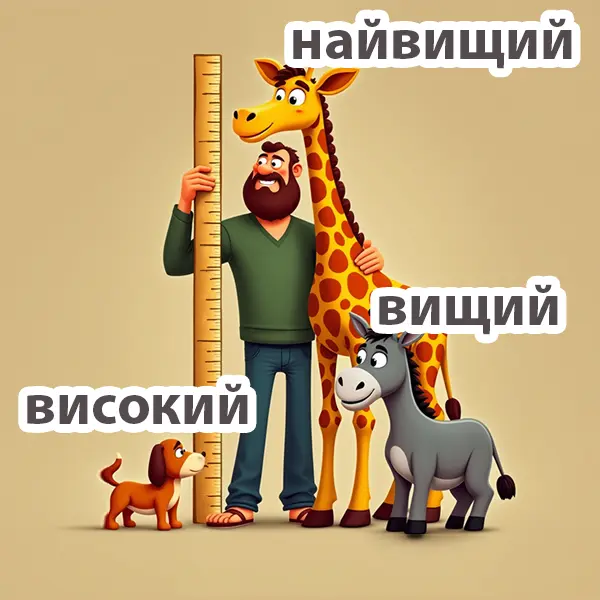
Most adjectives in Ukrainian have three different forms to show degrees of comparison the positive, the comparative, and the superlative. Comparative and superlative has two forms: simple and hard. Adjectives in the positive degree are used when no comparison is made. Comparative degree is used to compare two things or persons. …

Adjectives
The adjective (прикме́тник) is a word that describes a noun. It answers the question: Яки́й? / Чий? (which? / what? / what kind? whose?) Ukrainian adjectives agree with the nouns they modify in gender, number, and case: Си́ня ру́чка і си́ній оліве́ць. a blue pen and a blue pencilСи́ні ру́чки і си́ні олівці́. blue pens and blue pencilsЯ …

Vocative case
The Ukrainian language has a vocative case (кли́чний відмі́нок) that is used to address or call someone directly. It is used when you want to get someones attention, address them in conversation, or call out to them. Word кли́чний comes from the verb кли́кати (to call). Приві́т, Іва́не! Hi, Ivan! The vocative case can be used with …

Locative case
The locative case (знахі́дний відмі́нок) is used to express location, either in place or in time, its not used with the destination. Locative always comes with a preposition: на on, at, в, у in, at, and less frequently: о at (time), по along (motion), при by. The word місцевий is derived from Ukrainian місце (a place). Кни́га на я́щику …

Instrumental case
Instrumental case (орудний відмінок) is used to express that someone or something is used as a means by which an action is archived. The Ukrainian word орудний is derived from орудувати (to operate with). English uses prepositions by and with to indicate this case. Most common usages of instrumental case: expressing means or agency Я …

Accusative case
The accusative case (знахі́дний відмі́нок) is used to express a direct object of a verb (action). The word знахідний comes from the verb знаходити (to find). Він його́ ба́чить. He sees him.Вона́ її́ ба́чить. She sees her.Хлопець читає кни́гу. -The boy reads the book.Худо́жник малю́є карти́ну. The artist paints a picture.Мій брат шука́є …

Dative case
The dative case (дава́льний відмі́нок) is used to express an indirect object in a sentence. It indicates to whom (for whom) something is being done. The word давальний is derived from Ukrainian давати (to give). Most of the time it is used with animate nouns. Хло́пець пи́ше ді́вчині лист. A boy writes a girl a letter. Note: This case is …

Genitive case
The genitive case (родови́й відмі́нок) shows relationship, origin or possession. The word родовий comes from Ukrainian рід (a generation). The question you can ask is: Whose? From where? Of what? In English nouns, it is usually created by adding s to the word or by preceding it with of. Whose? (possession) Це кни́га студе́нта. This is …

Nominative case
The nominative case (називни́й відмі́нок) is used to indicate the subject of a sentence the person or thing performing the action. The word називни́й comes from the word на́зва (a name). Dictionaries use this case to list nouns. The only time you need to change the ending is when forming the plural. When to use it? 1. When a noun is a …

To make a plural form of a noun we need to know the gender and the group of nouns it belongs to. As you remember from the previous lesson there are three groups of nouns: hard, soft and mixed. Most of the time feminine nouns end in а/я, masculine nouns usually end in a consonant, neuter end in e/o. Masculine / Feminine Neuter Hard + …
